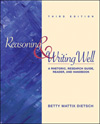 |  Reasoning and Writing Well: A Rhetoric, Research Guide, Reader, and Handbook, 3/e Betty Mattix Dietsch,
Marion Technical College
Summarizing & Paraphrasing| To integrate someone else's material into your writing, you need to be able to summarize and paraphrase. This means you rephrase the author's ideas into your words. To summarize, you condense the original, using fewer words to convey the same major point(s). Minor details are omitted. But when you paraphrase, you restate the original idea and details, using about the same number of words.
When summarizing or paraphrasing, be careful not to plagiarize. Do not carelessly borrow the author's words. You may borrow generic nouns for which there is no accurate synonym. If you can't avoid it, you can borrow small words such as articles and prepositions. But you need to find synonyms for other nouns, adjectives, verbs, and adverbs. In addition, you need to change the sentence structure so that it differs from that of the original. (See pages 381-387 of Reasoning and Writing Well, third edition.)
Start Exercise |
|



 2003 McGraw-Hill Higher Education
2003 McGraw-Hill Higher Education